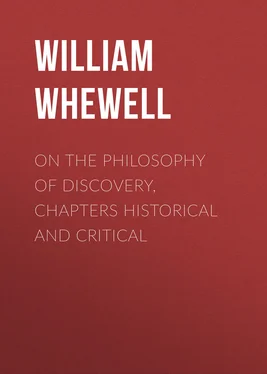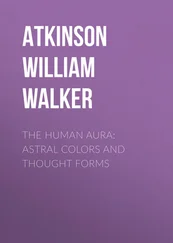William Whewell - On the Philosophy of Discovery, Chapters Historical and Critical
Здесь есть возможность читать онлайн «William Whewell - On the Philosophy of Discovery, Chapters Historical and Critical» — ознакомительный отрывок электронной книги совершенно бесплатно, а после прочтения отрывка купить полную версию. В некоторых случаях можно слушать аудио, скачать через торрент в формате fb2 и присутствует краткое содержание. Жанр: foreign_prose, foreign_religion, Философия, foreign_psychology, foreign_antique, на английском языке. Описание произведения, (предисловие) а так же отзывы посетителей доступны на портале библиотеки ЛибКат.
- Название:On the Philosophy of Discovery, Chapters Historical and Critical
- Автор:
- Жанр:
- Год:неизвестен
- ISBN:нет данных
- Рейтинг книги:5 / 5. Голосов: 1
-
Избранное:Добавить в избранное
- Отзывы:
-
Ваша оценка:
- 100
- 1
- 2
- 3
- 4
- 5
On the Philosophy of Discovery, Chapters Historical and Critical: краткое содержание, описание и аннотация
Предлагаем к чтению аннотацию, описание, краткое содержание или предисловие (зависит от того, что написал сам автор книги «On the Philosophy of Discovery, Chapters Historical and Critical»). Если вы не нашли необходимую информацию о книге — напишите в комментариях, мы постараемся отыскать её.
On the Philosophy of Discovery, Chapters Historical and Critical — читать онлайн ознакомительный отрывок
Ниже представлен текст книги, разбитый по страницам. Система сохранения места последней прочитанной страницы, позволяет с удобством читать онлайн бесплатно книгу «On the Philosophy of Discovery, Chapters Historical and Critical», без необходимости каждый раз заново искать на чём Вы остановились. Поставьте закладку, и сможете в любой момент перейти на страницу, на которой закончили чтение.
Интервал:
Закладка:
1. Bernardinus Telesius. —Italy, always, in modern times, fertile in the beginnings of new systems, was the soil on which these innovators arose. The earliest and most conspicuous of them is Bernardinus Telesius, who was born in 1508, at Cosenza, in the kingdom of Naples. His studies, carried on with great zeal and ability, first at Milan and then at Rome, made him well acquainted with the knowledge of his times; but his own reflections convinced him that the basis of science, as then received, was altogether erroneous; and led him to attempt a reform, with which view, in 1565, he published, at Rome, his work 108 108 Bernardini Telesii Consentini De Rerum Natura juxta propria Principia .
, " Bernardinus Telesius, of Cosenza, on the Nature of Things, according to principles of his own ." In the preface of this work he gives a short account 109 109 I take this account from Tenneman: this Proem was omitted in subsequent editions of Telesius, and is not in the one which I have consulted. Tenneman, Gesch. d. Phil. ix. 280.
of the train of reflection by which he was led to put himself in opposition to the Aristotelian philosophy. This kind of autobiography occurs not unfrequently in the writings of theoretical reformers; and shows how livelily they felt the novelty of their undertaking. After the storm and sack of Rome in 1527, Telesius retired to Padua, as a peaceful seat of the muses; and there studied philosophy and mathematics, with great zeal, under the direction of Jerome Amalthæus and Frederic Delphinus. In these studies he made great progress; and the knowledge which he thus acquired threw a new light upon his view of the Aristotelian philosophy. He undertook a closer examination of the Physical Doctrines of Aristotle; and as the result of this, he was astonished how it could have been possible that so many excellent men, so many nations, and even almost the whole human race, should, for so long a time, have allowed themselves to be carried away by a blind reverence for a teacher, who had committed errors so numerous and grave as he perceived to exist in "the philosopher." Along with this view of the insufficiency of the Aristotelian philosophy, arose, at an early period, the thought of erecting a better system in its place. With this purpose he left Padua, when he had received the degree of Doctor, and went to Rome, where he was encouraged in his design by the approval and friendly exhortations of distinguished men of letters, amongst whom were Ubaldino Bandinelli and Giovanni della Casa. From Rome he went to his native place, when the incidents and occupations of a married life for a while interrupted his philosophical project. But after his wife was dead, and his eldest son grown to manhood, he resumed with ardour the scheme of his youth; again studied the works of Aristotle and other philosophers, and composed and published the first two books of his treatise. The opening to this work sufficiently exhibits the spirit in which it was conceived. Its object is stated in the title to be to show, that "the construction of the world, the magnitude and nature of the bodies contained in it, are not to be investigated by reasoning, which was done by the ancients, but are to be apprehended by the senses, and collected from the things themselves." And the Proem is in the same strain. "They who before us have inquired concerning the construction of this world and of the things which it contains, seem indeed to have prosecuted their examination with protracted vigils and great labour, but never to have looked at it ." And thus, he observes, they found nothing but error. This he ascribes to their presumption. "For, as it were, attempting to rival God in wisdom, and venturing to seek for the principles and causes of the world by the light of their own reason, and thinking they had found what they had only invented, they made an arbitrary world of their own." " We then," he adds, "not relying on ourselves, and of a duller intellect than they, propose to ourselves to turn our regards to the world itself and its parts."
The execution of the work, however, by no means corresponds to the announcement. The doctrines of Aristotle are indeed attacked; and the objections to these, and to other received opinions, form a large part of the work. But these objections are supported by à priori reasoning, and not by experiments. And thus, rejecting the Aristotelian physics, he proposes a system at least equally baseless; although, no doubt, grateful to the author from its sweeping and apparently simple character. He assumes three principles, Heat, Cold, and Matter: Heat is the principle of motion, Cold of immobility, and Matter is the corporeal substratum, in which these incorporeal and active principles produce their effects. It is easy to imagine that, by combining and separating these abstractions in various ways, a sort of account of many natural phenomena may be given; but it is impossible to ascribe any real value to such a system. The merit of Telesius must be considered to consist in his rejection of the Aristotelian errors, in his perception of the necessity of a reform in the method of philosophizing, and in his persuasion that this reform must be founded on experiments rather than on reasoning. When he said 110 110 Proem.
, "We propose to ourselves to turn our eyes to the world itself, and its parts, their passions, actions, operations, and species," his view of the course to be followed was right; but his purpose remained but ill fulfilled, by the arbitrary edifice of abstract conceptions which his system exhibits.
Francis Bacon, who, about half a century later, treated the subject of a reform of philosophy in a far more penetrating and masterly manner, has given us his judgment of Telesius. In his view, he takes Telesius as the restorer of the Atomic philosophy, which Democritus and Parmenides taught among the ancients; and according to his custom, he presents an image of this philosophy in an adaptation of a portion of ancient mythology 111 111 "De Principiis atque Originibus secundum fabulas Cupidinis et Cœli: sive Parmenidis et Telesii et præcipuè Democriti Philosophia tractata in Fabula de Cupidine."
. The Celestial Cupid, who with Cœlus, was the parent of the Gods and of the Universe, is exhibited as a representation of matter and its properties, according to the Democritean philosophy. "Concerning Telesius," says Bacon, "we think well, and acknowledge him as a lover of truth, a useful contributor to science, an amender of some tenets, the first of recent men. But we have to do with him as the restorer of the philosophy of Parmenides, to whom much reverence is due." With regard to this philosophy, he pronounces a judgment which very truly expresses the cause of its rashness and emptiness. "It is," he says, "such a system 112 112 "Talia sunt qualia possunt esse ea quæ ab intellectu sibi permisso, nec ab experimentis continenter et gradatim sublevato, profecta videntur."
as naturally proceeds from the intellect, abandoned to its own impulse, and not rising from experience to theory continuously and successively." Accordingly, he says that, "Telesius, although learned in the Peripatetic philosophy (if that were anything), which indeed, he has turned against the teachers of it, is hindered by his affirmations, and is more successful in destroying than in building."
The work of Telesius excited no small notice, and was placed in the Index Expurgatorius . It made many disciples, a consequence probably due to its spirit of system-making, no less than to its promise of reform, or its acuteness of argument; for till trial and reflection have taught man modesty and moderation, he can never be content to receive knowledge in the small successive instalments in which nature gives it forth to him. It is the makers of large systems, arranged with an appearance of completeness and symmetry, who, principally, give rise to Schools of philosophy.
Читать дальшеИнтервал:
Закладка:
Похожие книги на «On the Philosophy of Discovery, Chapters Historical and Critical»
Представляем Вашему вниманию похожие книги на «On the Philosophy of Discovery, Chapters Historical and Critical» списком для выбора. Мы отобрали схожую по названию и смыслу литературу в надежде предоставить читателям больше вариантов отыскать новые, интересные, ещё непрочитанные произведения.
Обсуждение, отзывы о книге «On the Philosophy of Discovery, Chapters Historical and Critical» и просто собственные мнения читателей. Оставьте ваши комментарии, напишите, что Вы думаете о произведении, его смысле или главных героях. Укажите что конкретно понравилось, а что нет, и почему Вы так считаете.












